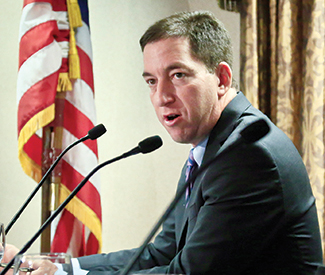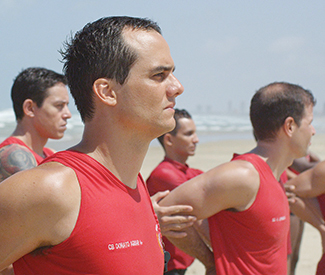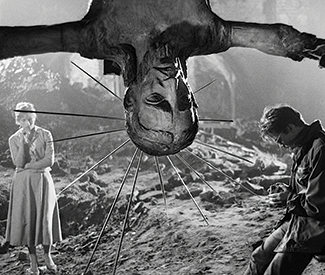By Norman Solomon
(Norman Solomon is executive director of the Institute for Public Accuracy and co-founder of RootsAction.org. His books include “War Made Easy: How Presidents and Pundits Keep Spinning Us to Death.” Information about the documentary based on the book is at www.WarMadeEasyTheMovie.org.)
In a memoir published this year, the CIA’s former top legal officer John Rizzo says that on the last day of 2005 a panicky White House tried to figure out how to prevent the distribution of a book by New York Times reporter James Risen. Officials were upset because Risen’s book, State of War, exposed what — in his words — “may have been one of the most reckless operations in the modern history of the CIA.”
The book told of a bungled CIA attempt to set back Iran’s nuclear program in 2000 by supplying the Iranian government with flawed blueprints for nuclear-bomb design. The CIA’s tactic might have actually aided Iranian nuclear development.
When a bootlegged copy of State of War reached the National Security Council, a frantic meeting convened in the Situation Room, according to Rizzo. “As best anyone could tell, the books were printed in bulk and stacked somewhere in warehouses.” The aspiring censors hit a wall. “We arrived at a rueful consensus: game over as far as any realistic possibility to keep the book, and the classified information in it, from getting out.”
But more than eight years later, the Obama White House is seeking a different form of retribution. The people running the current administration don’t want to pulp the book — they want to put its author in jail.
The Obama administration is insisting that Risen name his confidential source — or face imprisonment. Risen says he won’t capitulate.
The Freedom of the Press Foundation calls the government’s effort to force Risen to reveal a source “one of the most significant press freedom cases in decades.”
Pentagon Papers whistleblower Daniel Ellsberg says: “The pursuit of Risen is a warning to potential sources that journalists cannot promise them confidentiality for disclosing Executive Branch criminality, recklessness, deception, unconstitutional policies or lying us into war. Without protecting confidentiality, investigative journalism required for accountability and democracy will wither and disappear.”
A recent brief from the Obama administration to the nation’s top court “is unflinchingly hostile to the idea of the Supreme Court creating or finding protections for journalists,” Politico reported. The newspaper added that Risen “might be sent to jail or fined if he refuses to identify his sources or testify about other details of his reporting.”
This threat is truly ominous. As Ellsberg puts it, “We would know less than we do now about government abuses, less than we need to know to hold officials accountable and to influence policy democratically.”
So much is at stake: for whistleblowers, freedom of the press and the public’s right to know. For democracy.
That’s why five organizations — RootsAction.org, The Nation, the Center for Media and Democracy / The Progressive, Fairness & Accuracy In Reporting (FAIR) and the Freedom of the Press Foundation — have joined together to start a campaign for protecting the confidentiality of journalists’ sources. So far, in May, about 50,000 people have signed a petition telling President Obama and Attorney General Eric Holder to end legal moves against Risen.
Charging that the administration has launched “an assault on freedom of the press,” the petition tells Obama and Holder: “We urge you in the strongest terms to halt all legal action against Mr. Risen and to safeguard the freedom of journalists to maintain the confidentiality of their sources.”
The online petition — “We Support James Risen Because We Support a Free Press” — includes thousands of personal comments from signers. Here’s a sampling of what they had to say:
“Freedom of the press and freedom of speech are the cornerstones of our democracy. Stop trying to restrict them.” Jim T., Colorado Springs, Colorado
“Protected sources are essential to a real democracy. Without whistleblowers, there is no truth.” Jo Ellen K., San Francisco, California
“Enough of the government assault on freedom of the press! Whistleblowers are heroes to the American people.” Paul D., Keaau, Hawaii
“It seems our government is out of control. The premise of deriving power from the people would appear to be a quaint notion to most within the three branches. Instead they now view us as subjects that must bend to their will rather than the other way around.” Gary J., Liberty Township, Ohio
“‘Journalism is printing what someone else does not want printed. Everything else is public relations.’ — George Orwell” Todd J., Oxford, Michigan
“As a writer, I support freedom of the press around the world as a vital first step toward regaining control of our compromised democracies.” Patricia R., Whitehorse, YT, Canada
“You promised an open and transparent administration. Please keep that promise.” Willard S., Cary, North Carolina
“Without a free press, we really have nothing.” Robin H., Weehawken, New Jersey
“The Obama administration’s attack on press freedom is an issue of grave concern. Why are we spending billions of dollars going after supposed ‘terrorists’ when the greatest threat to democracy resides right here in Washington, DC.” Karen D., Detroit, Michigan
“Damn you, Obama! You become more like Nixon daily!” Leonard H., Manchester, Michigan
“Congratulations, Mr. Risen!” Marian C., Hollister, California
“The U.S. is becoming an increasingly frightening place to live, more than a little like a police state. President Obama, you have been a huge disappointment. I expected better from you.” Barbara R., Newport, Rhode Island
“Come on, President Obama… you’re a Constitutional scholar. You know better than this. Knock it off.” James S., Burbank, California
“There can be no true freedom of the press unless the confidentiality of sources is protected. Without this, no leads, informants or whistleblowers will be motivated to come forward. Reporters should not be imprisoned for doing their job.” Chris R., North Canton, Ohio
“You took an oath to ‘preserve, protect and defend the Constitution of the United States,’ freedom of the press!” Diane S., San Jose, California
“Whatever became of the progressive Obama and the change you promised? Evidently it was a load of campaign bull puckey, making you just another politician who says whatever it takes to get elected. In other words, you and your administration are a complete sham. As for your constitutional scholarship, it would appear to be in the service of undermining the Constitution a la Bush and Cheney.” Barry E., Bryn Mawr, Pennsylvani
“Without a free press, our republic is paper-mache. Remember John Peter Zenger! We must not shoot the messenger — we must raise the bar for conduct and probity!” Lance K., Chelsea, Massachusetts
“A free press is the only counterbalance to crony capitalism, corrupt legislators, and a pitifully partisan Supreme Court, that continues to destroy our Constitutional protections.” Dion B., Cathedral City, California
“I implore you to RESPECT THE FIRST AMENDMENT.” Glen A., Lacey, Washington
“Did you not learn in grade school that freedom of the press is essential to a free country?” Joanne D., Colorado Springs, Colorado
“We’ve been down this road before. What amazes me is that we condemn other countries for stifling freedom of the press, then turn around and do the same thing to advance our own purposes. Are we proponents of democracy and a free press or not?” William M., Whittier, California
“Journalism is a vital component of a democracy, and it is a core function protected by the freedom of expression enshrined in both international and domestic law. You must stop harassing and persecuting journalists and their sources who are providing a vital public service in prying open the activities of governments that are illegitimately concealed from the public. If the public is not informed of state actions executed in their name, they cannot evaluate and render consent to those actions through the vote. This secrecy therefore subverts democracy, and you must stop using police powers to destroy the whistleblowers who enable government accountability to the public.” Jim S., Gatlinburg, Tennessee
“I support freedom of the press, not the attorney general’s vicious abuse of his position!” Bettemae J., Albuquerque, New Mexico
“Compelling reporters to reveal their sources just means that sources will stop talking to reporters. That will cripple the free press. If you think that’s not important, please resign immediately.” Stephen P., Gresham, Oregon
“As an old woman who remembers the lies of Lyndon Johnson, Richard Nixon, Ronald Reagan, Bill Clinton, George W. Bush (especially) and the current administration, I do not trust my own government to tell me the truth anymore. Freedom of the press is my only chance [to] find out what the truth is. Protect reporters’ sources!” Monica O., Lomita, California
“Without freedom of the press, we might as well kiss democracy goodbye!” Melvin M., Vashon, Washington
“I am ashamed of this administration, its policies and its Department of Justice — what a travesty of criminal turpitude and mass media complicity. ‘Transparency’ — hah! Cheap campaign rhetoric.” Mitch L., Los Altos Hills, California
“Walk the walk or stop talking about democracy. Free press is the basis of our constitution.” Carl D., Manassas, Virginia
“No free press, no democracy!” James F., Moab, Utah
“If you force the media to reveal its sources, no one will ever come forth with a news story or lead again. I’m sure this is precisely what the politicians and big business want. Then there’d be absolutely no accountability. We need an effective shield law rather than persecuting journalists and news organizations for reporting the news.” Jim S., Ladera Ranch, California
“Freedom of the Press is the hallmark of a free society. Your administration has done everything in its power to subvert Freedom of the Press by jailing whistleblowers and reporters who uncover wrong doing. This must stop!” Ed A., Queens, New York
“We have very few real journalists left. Let’s not jail them!” Karen H., West Grove, Pennsylvania
“As the press goes, so goes citizens’ rights.” Kathy F., West Bend, Wisconsin
“I have been shocked at how this administration has treated the American people’s right to know, prosecuting reporters, whistleblowers, and others who have had the temerity to cast light into the dark corners of our government. You bring the whole concept of democracy into disrepute and set a bad example for the rest of the world.” Marjorie P., Montpelier, Vermont
“We need our investigative reporters more now than ever in history. Keep our press free.” Joan R., Novato, California
“Investigative reporting is becoming too rare in the U.S., and compelling J. Risen to reveal his sources will only make such reporting even rarer. Is this your deliberate intent?” Elaine L., Elk Grove, California
“I am responding in support of James Risen. Freedom of the press is one of the cornerstones of our democracy and should never be trampled on by government.” Lois D., San Jacinto, California
“Freedom of the press is more important than some stinking government attempt to find out how bad shenanigans made it into the press. Quit this crap about trying to make a reporter reveal his or her sources. We need good reporting a lot more than lousy stinking politicians trying to shut up the truth.” Ralph M., Bakerstown, Pennsylvania
“Without a free press tyranny will ensue.” Bob P., Holland, Pennsylvania
“I thought Mr. Obama was supposed to be a Constitutional lawyer and swore to uphold it. I thought the Attorney General was supposed to also protect the Constitution. It seems you both have abandoned those duties. Prove you hold the Constitution as the authority from which you derive your own and cease this persecution of a reporter who epitomizes one of the crucial things the Constitution stands for — a truly free press.” Michael S., Tukwila, Washington
“I’ve seen mud more transparent than the Obama admin.” Paul H., Carlton, Oregon
“Wow, this coming from the Obama administration who supposedly is for open govt. Isn’t it a police state when the govt cracks down on reporters for telling the truth? James Risen is a hero who will go to jail before revealing his source and the fact that you want to throw him in jail is the real crime here.” Gayle J., Seattle, Washington
“Shocking.” Peggy K., Soldiers Grove, Wisconsin
“You have way overstepped your authority. I consider myself a moderate, but your aggressive pursuit of journalists and whistleblowers strikes fear in my heart. Your use of intimidation to weaken the press is contributing to the dismantling of our democracy.” Marcia B., Pittsburgh, Pennsylvania
“Quit trying to silence journalists! This is a Vladimir Putin approach to government. Hope and Change? Get Real!” Rich W., Grass Valley, California
“Stop destroying our heroes, the courageous whistleblowers and journalists, including Risen and others who should be thanked, not prosecuted! You know damn well that the People want these people honored!” Nancy G., Palm Desert, California
“Please recognize the need for a journalist to be free of coercion to reveal confidential sources. Bravo to James Risen for having the courage to resist this onerous government intimidation.” Thomas S., Pittsburgh, Pennsylvania
“We are already seeing freedom of the press undermined by consolidation of media ownership. The founding fathers believed that we could only keep this republic if we have free press and an informed public. Stop the suppression of information. Free access to information is not an optional ingredient.” Janelle J., Buffalo, Missouri
“Stop persecuting journalists and whistleblowers. Information is the lifeblood of a democracy.” William C., Sherman Oaks, California
“Our government has become big brother. Journalists must not be forced to name their sources if we are to know the truth.” Carolyn S., Los Angeles, California
“A free press is gone if confidential sources are revealed.” Vincent H., Rutledge, Tennessee
“Frankly, Mr. President, I’m surprised at you, and I have to say, disappointed. This seems like something that happens in totalitarian countries.” Karen B., Felton, California
“Freedom of the press is already under siege because big business controls so much of the message. The Obama administration must respect James Risen’s right to withhold his source.” Patricia B., Marco Island, Florida
“Whistleblowers are vital to keeping our democracy from turning into a police state. And a free press is vital to keeping us informed. Drop this case, and uphold the principles of our Constitution.” Cynthia D., E. Boston, MA
“The press should be free to do its job! How about some of that ‘most transparent administration’ stuff. If an administration has nothing to hide it has nothing to fear.” Mike H., Terre Haute, Indiana
“James Risen is an investigative reporter of high repute who should not be subjected to state harassment and punishment for upholding his pledge of confidentiality to his sources. These encroachments on our Fourth Estate’s watchdog function as a check on the abuse of power must not stand.” Barbara K., Santa Fe, New Mexico
“You both have to stop talking out of both sides of your mouth, i.e. lying. We are fighting for freedom of the press. Stop being enemies to us people.” Judith N., North Bonneville, Washington
“Please don’t trash the Bill of Rights. Protect the freedom and independence of the press. Drop the case against James Risen.” Andrew M., Lower Gwynedd, Pennsylvania
“Daniel Ellsberg was right. James Risen is right.” Leonore J., Toledo, Ohio
“When the light of free press is no more, darkness prevails and evildoers flourish. I know this is what this corrupt government wants but over our dead bodies.” Felix C., San Antonio, Texas
“What Mr. Risen did in this instance, was not criminal. Rather it was EXACTLY what a free press should do, without fear of reprisal. Stop the strong arm tactics.” John S., Trumbull, Connecticut
“The investigative work of journalists sheds light on the world and what is happening. The increasing punishment of journalists is pushing our world and news into a scary age of non-information. Safeguard the confidentiality of journalists and their sources.” Christin B., Barnegat Light, New Jersey
“Stop persecuting journalists and truth tellers.” Phyllis B., Desert Hot Springs, California
Norman Solomon is executive director of the Institute for Public Accuracy and co-founder of RootsAction.org. His books include “War Made Easy: How Presidents and Pundits Keep Spinning Us to Death.” Information about the documentary based on the book is at www.WarMadeEasyTheMovie.org.
(The Bruce blog is written and edited by Bruce B. Brugmann, editor at large of the San Francisco Bay Guardian. He is the former co-founder and co-publisher with his wife Jean Dibble, 1966-2012.)
James Risen is printing the news and raising hell for a damn good cause in the best jounalistic tradition. He needs our support. B3










